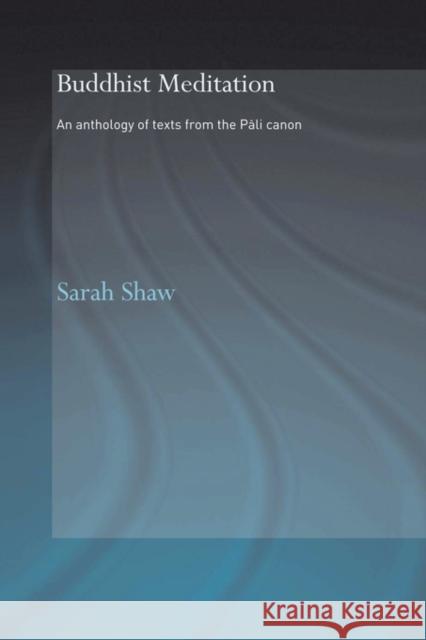Buddhist Meditation: An Anthology of Texts from the Pali Canon » książka
Buddhist Meditation: An Anthology of Texts from the Pali Canon
ISBN-13: 9780415485685 / Angielski / Miękka / 2008 / 242 str.
Buddhist Meditation: An Anthology of Texts from the Pali Canon
ISBN-13: 9780415485685 / Angielski / Miękka / 2008 / 242 str.
(netto: 275,16 VAT: 5%)
Najniższa cena z 30 dni: 270,87
ok. 16-18 dni roboczych.
Darmowa dostawa!
Meditative practice lies at the heart of the Buddhist tradition. This introductory anthology gives a representative sample of the various kinds of meditations described in the earliest body of Buddhist scripture, the Pali canon. It provides a broad introduction to their traditional context and practice and supplies explanation, context and doctrinal background to the subject of meditation. The main themes of the book are the diversity and flexibility of the way that the Buddha teaches meditation from the evidence of the canon. Covering fundamental features of Buddhist practice such as posture, lay meditation, and meditative technique it provides comments both from the principal early commentators on Buddhist practice, Upatissa and Buddhaghosa, and from reputable modern meditation teachers in a number of Theravadin traditions. This is the first book on Pali Buddhism which introduces the reader to the wide range of the canon. It demonstrates that the Buddha's meditative tradition still offers a path of practice as mysterious, awe-inspiring yet as freshly accessible as it was centuries ago, and will be of interest to students and scholars of Buddhism as well as Buddhist practitioners.
Meditative practice lies at the heart of the Buddhist tradition. This introductory anthology gives a representative sample of the various kinds of meditations described in the earliest body of Buddhist scripture, the Pali canon.
It provides a broad introduction to their traditional context and practice and supplies explanation, context and doctrinal background to the subject of meditation. The main themes of the book are the diversity and flexibility of the way that the Buddha teaches meditation from the evidence of the canon. Covering fundamental features of Buddhist practice such as posture, lay meditation, and meditative technique it provides comments both from the principal early commentators on Buddhist practice, Upatissa and Buddhaghosa, and from reputable modern meditation teachers in a number of Theravadin traditions.
This is the first book on Pali Buddhism which introduces the reader to the wide range of the canon. It demonstrates that the Buddha's meditative tradition still offers a path of practice as mysterious, awe-inspiring yet as freshly accessible as it was centuries ago, and will be of interest to students and scholars of Buddhism as well as Buddhist practitioners.











